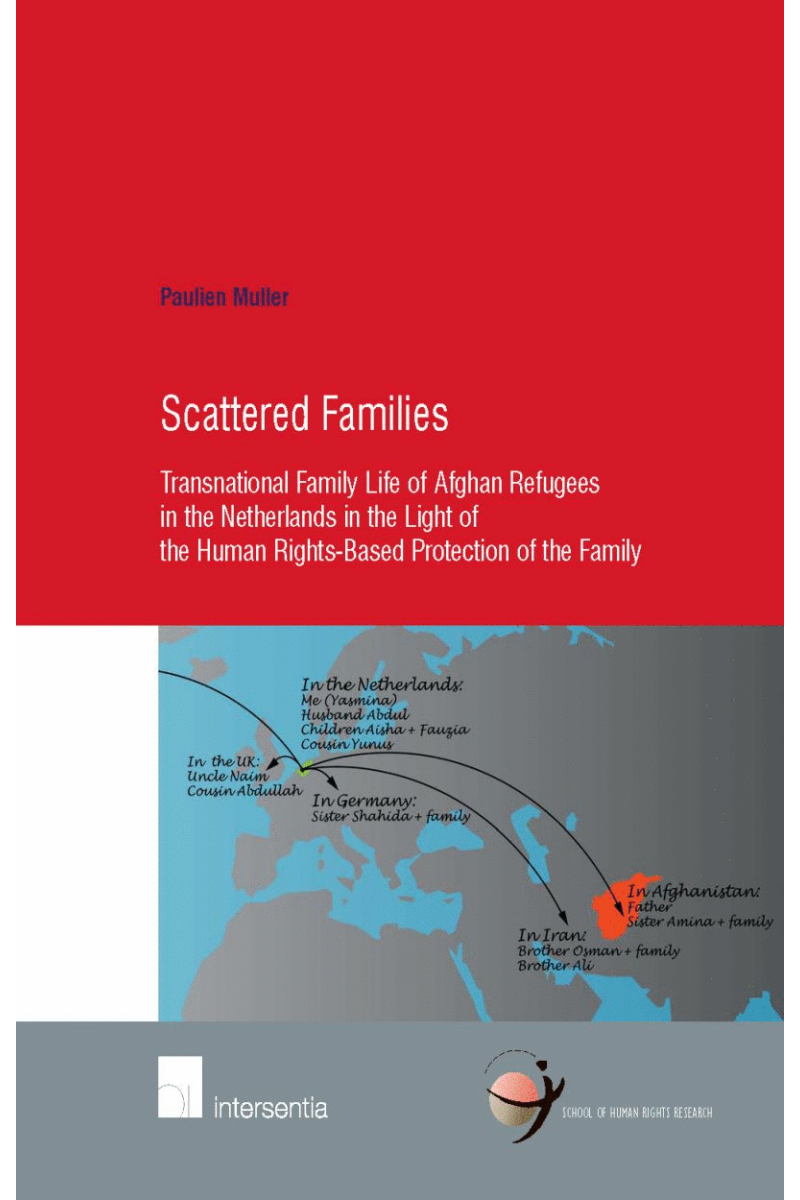 maestro
mastercard
visa
maestro
mastercard
visa

Scattered Families
Transnational Family Life of Afghan Refugees in The Netherlands in the Light of the Human Rights-Based Protection of the Family

When people are forced to flee their country, their families fall apart. This also applies to the 37,000 Afghans who found refuge in the Netherlands. Many of them experienced how their extended families got scattered over different countries and continents as a result of conflict, war and the necessity to flee.
From a human rights perspective the family is considered to be the cornerstone of society and therefore needs to be respected and protected. The vulnerability of migrants in general, and refugees in particular, with regard to their family life is reflected in several international treaties that offer protection in this respect, e.g. the Convention on the Rights of the Child and the European Convention on Human Rights. This book starts from an upstream human rights approach and explores to what extent refugees indeed experience the protection of their family life.
The qualitative research of Paulien Muller among 37 Afghans in the Netherlands and their families gives insight in how these refugees (re)constructed and perceived their family life within and across borders; at the nuclear family level, within the Western diaspora, and with family members who stayed behind in Afghanistan, Pakistan or Iran. The study shows that besides the impact of immigration and integration policies on constructing a transnational family life, socio-economic and socio-cultural factors played a role. Not only did the weak economic position of the Afghans in the Netherlands undermine the former function of the extended family as a support network; the Dutch and Western culture was sometimes also perceived as a threat to the familial cohesion.
The paradox of the often rather intensive transnational family ties that these refugees maintained was that they were continually confronted with the distance and borders between them and their family members elsewhere. As a respondent put it: "What happened to my family is like a glass that fell on the ground; it breaks and shatters and you cannot mend it."
About this book
‘It is remarkable that the author has chosen an “upstream” human rights perspective from which she conducts qualitative research from the Afghan refugees’ viewpoint. […] With this work, the author questions our western view on the protection of family life. [This book ] is recommended to everyone wanting to approach the right to a family life from an anthropological angle.’
X. in Tijdschrift voor Vreemdelingenrecht (2010) 382.
About the author:
Paulien Muller obtained a master's degree in interdisciplinary social sciences (cum laude) at Utrecht University. She then worked as a researcher in several organizations, including the European Research Centre on Migration and Ethnic Relations (ERCOMER) and Pharos, centre of expertise on refugees' health. She conducted research on a variety of topics concerning undocumented migrants, asylum seekers and refugees in the Netherlands and she co-authored a book on the meaning of return for refugees. From 2004 until 2009 she worked at the Netherlands Institute of Human Rights (SIM), where she completed her PhD thesis.
| Type of product | Book |
|---|---|
| Format | Paperback |
| EAN / ISSN | 9789400000216 |
| Series name | Human Rights Research Series |
| Weight | 425 g |
| Status | Available |
| Number of pages | xiv + 228 p. |
| Access to exercice | No |
| Publisher | Intersentia |
| Language | English |
| Publication Date | Apr 21, 2010 |
| Available on Strada Belgique | No |
| Available on Strada Europe | No |
| Available on Strada Luxembourg | No |
Downloads
- Table of Contents
- CHAPTER 1. INTRODUCTION
- CHAPTER 2. COMING FROM A FRAGMENTIZED SOCIETY TO THE NETHERLANDS
- CHAPTER 3. FRAGMENTATION BECAUSE OF CONFLICT, WAR AND THE NECESSITY TO FLEE
- CHAPTER 4. FAMILY LIFE IN THE HOUSEHOLD – INTEGRATION, NEGOTIATION AND TRANSFORMATION
- CHAPTER 5. FAMILY LIFE IN THE WEST – A MATTER OF TRUST
- CHAPTER 6. FAMILY LIFE WITH STAY-BEHINDS – BETWEEN REMITTANCES AND RETURN
- CHAPTER 7. CONCLUSION
- Samenvatting (summary in Dutch)
- References
- Curriculum vitae